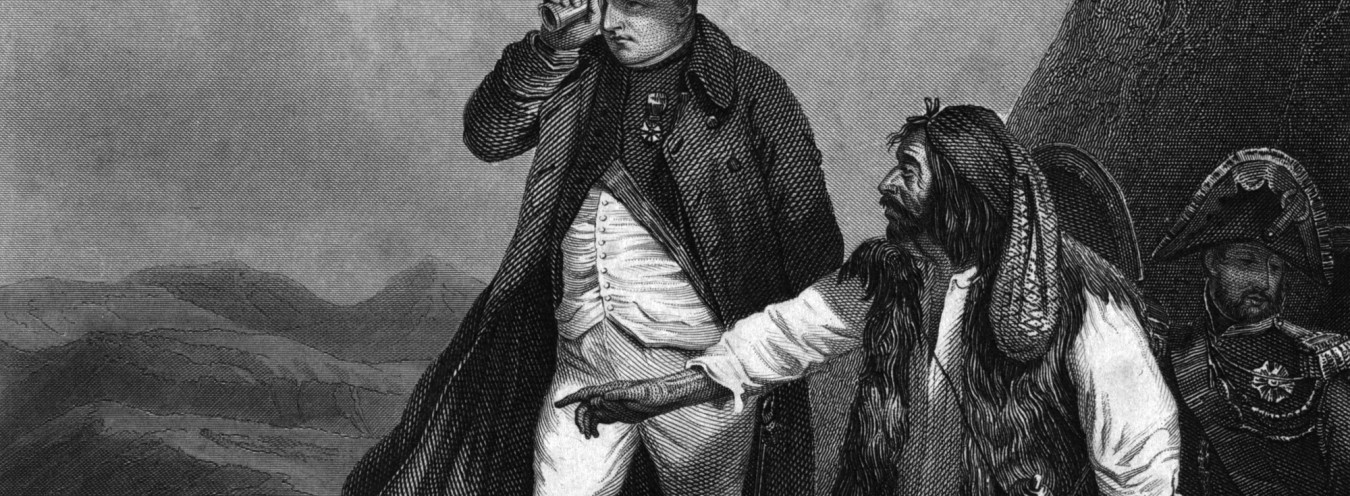
Napoleon Bonaparte
[Ignacy Rzecki’s father would tell his son:] Remember that God sent the Bonapartes to put the world to rights and as long as there is no order and no justice in the world, then the Emperor’s last testament will not have been carried out. (14)
The Napoleonic era holds a special place for the characters of The Doll. The author evidently never loses sight of the fact that under Napoleon Bonaparte, Europe saw the establishment of a small Polish state, the Duchy of Warsaw (1807–1813), which was given a chance to expand by liberating the Polish territories from Russian occupation (1812). Hopes for this turn of affairs were shattered by the Emperor’s failure to invade Russia and the military actions that followed, which ended in 1815 by constraining France to its pre-1789 borders and abolishing its zone of influence in Europe.
In The Doll, Ignacy Rzecki worships Napoleon and ardently supports the claim that the Bonaparte dynasty is destined to bring order and justice into European international relations. The author made him a son of a Napoleonic soldier (there is no hint whether the father fought in the Polish Legions or the Army of the Duchy of Warsaw). Since early childhood, young Ignacy is trained by his parent to fight in a future war of independence. Jan Lechoń, a Polish poet and critic, once wrote that Rzecki represented Polish insurgents who fought in Italy, the Ottoman Empire, Hungary, and spent the rest of their lives browsing through newspapers to find out if there is no new Bonaparte coming to finally do away with the Germans and Muscovites.
In many places, especially in the chapters entitled “The Journal of the Old Clerk,” the career of Napoleon III – nephew to Napoleon I – is followed event by event (his first political proclamation in 1840, his arrest, escape from prison, the part he played in the Springtime of Nations, the victorious presidential election in France, the coup d’état and announcement of the Second Empire, the successful Italian campaign). “The Journal” also makes a reference to “Lulu” – Napoleon IV, the only son of Napoleon III, who at that time was supposed to be preparing himself for the role of the soldier and the leader. The life of Napoleon III is thus summarised by Rzecki: We all saw how the second Napoleon’s star rose over Italy and Hungary; and although it sank at Sedan, I do not believe it has been extinguished for ever.
As a matter of fact, even though the Springtime of Nations did start with the Revolution of 1848 in Paris, the overthrow of King Louis Philippe and the proclamation of the Second Republic, the French chapter did not constitute the key episode as similar revolutions and uprisings spread over a large part of Europe (Germany, Italy, Hungary). Also, Louis Napoleon did not make a mark even during the February Revolution: the fact that he won the presidential election came partly as a surprise and was largely due to French peasants’ votes. Louis Napoleon conducted the coup d’état on 2 December 1851, establishing the Second Empire (1852–1870). The Emperor was an active foreign affairs player. During the Crimean War (1853–1856), France and Britain supported the Ottoman Empire against Russia, which ended in the latter’s defeat. In 1859, Napoleon III assumed the role of the protector of Italian unification and allied with Victor Emmanuel, King of Piedmont-Sardinia, to defeat Austria. 11 years later, he responded to a provocation of Otto von Bismarck and declared war on Prussia. He intended to make territorial gains, but the war started with some heavy defeats: the Battle of Sedan (in which Napoleon himself surrendered) and the capitulation of the French army in Metz. Following these humiliations the Emperor was deposed, and a devastating siege of Paris forced the new republican government to make peace on the enemy’s terms. France lost Alsatia and Lorraine, paid 5 billion francs in gold, and had to suffer a partial German occupation for some time. Louis Napoleon never returned to pursuing politics; his son died too young to even begin to do so.


